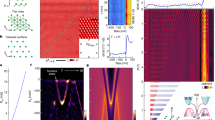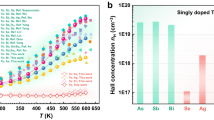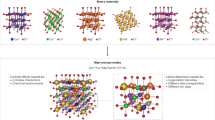Abstract
THE bonding between molecules in bulk solid C60 is extremely weak, making it a narrow-band semiconductor with an energy gap of 1.5 eV (ref. 1) for the face-centred cubic phase. Doping with alkali metals produces a metallic state which can be superconducting at temperatures as high as 33 K (ref. 2). The intermolecular coupling should have an important influence on the conductivity of the pure, semiconducting state: stronger coupling might induce a transition to a metallic or possibly even superconducting state, as is the case for silicon3, or it may result in a covalent solid such as diamond4. We have explored these possibilities by measuring the electrical resistivity of solid granular C60 up to pressures of 25 GPa. Our results show that the magnitude of the gap and the resistivity decrease with increasing pressures as the sample volume5 decreases. But eventual gap closure to give a metallic state is not observed; instead, there is a sudden transition at 15–20 GPa to a more insulating phase, possibly with covalent intermolecular bonding.
This is a preview of subscription content, access via your institution
Access options
Subscribe to this journal
Receive 51 print issues and online access
$199.00 per year
only $3.90 per issue
Buy this article
- Purchase on Springer Link
- Instant access to full article PDF
Prices may be subject to local taxes which are calculated during checkout
Similar content being viewed by others
References
Saito, S. & Oshiyama, A. Phys. Rev. Lett. 66, 2637–2640 (1991).
Fleming, R. M. et al. Nature 352, 787–788 (1991).
Chang, K. J. et al. Phys. Rev. Lett. 54, 2375–2378 (1985).
Ruoff, R. S. & Ruoff, A. L. Nature 350, 663–664 (1991).
Duclos, S. J., Brister, K., Haddon, R. C., Kortan, A. R. & Thiel, F. A. Nature 351, 380–382 (1991).
Kraetschmer, W., Lamb, L. D., Fostiropoulos, L. D. & Huffman, D. R. Nature 347, 354–358 (1990).
Haufler, R. E. et al. J. phys. Chem. 95, 8634 (1990).
Mort, J., Ziolo, R., Machonkin, M., Huffman, D. R. & Ferguson, M. I. Chem. Phys. Lett. (in the press).
Heiney, P. A. et al. Phys. Rev. Lett. 66, 2911–2914 (1991).
Tolbert, S. H., Alivisatos, A. P., Lorenzana, H. E., Kruger, M. B. & Jeanloz, R. Chem. Phys. Lett. (submitted).
Kriza, G. et al. J. Phys. I (France) 1, 1361 (1991).
Samara, G. A. et al. Phys. Rev. Lett. (in the press).
Appel, J. & Lautz G. Physica 20, 1110 (1954).
Bube, R. H., Phys. Rev. 106, 703 (1957).
Gressier, P., Meerschaut, A., Guemas, L., Rouxel, J. & Monceau, P. J. Solid St. Chem. 51, 141–151 (1984).
Author information
Authors and Affiliations
Rights and permissions
About this article
Cite this article
Regueiro, M., Monceau, P., Rassat, A. et al. Absence of a metallic phase at high pressures in C60. Nature 354, 289–291 (1991). https://doi.org/10.1038/354289a0
Received:
Accepted:
Issue Date:
DOI: https://doi.org/10.1038/354289a0
This article is cited by
-
Tunable electrical properties of C60·m-xylene and the formation of semiconducting ordered amorphous carbon clusters under pressure
Nano Research (2022)
-
Mapping intermolecular bonding in C60
Scientific Reports (2014)
Comments
By submitting a comment you agree to abide by our Terms and Community Guidelines. If you find something abusive or that does not comply with our terms or guidelines please flag it as inappropriate.



